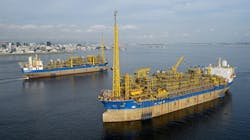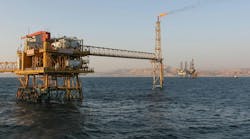ADIPEC 2025: AVEVA VP on the future of offshore, from FPSO autonomy to digital upskilling
Key Highlights
- AVEVA develops digital twins of FPSOs to improve visualization, reliability, and operational efficiency throughout the asset lifecycle.
- AI-infused solutions are designed to optimize offshore asset performance, reduce unplanned downtime and support predictive maintenance strategies.
- Remote operations and digital upskilling are key to supporting the evolving offshore workforce and ensuring safety and reliability.
By Ariana Hurtado, Editor-in-Chief
During this week's ADIPEC Exhibition and Conference, Nayef Bou Chaaya, AVEVA's vice president (VP) of Middle East, Africa and Turkey, chatted with Offshore about the digital transformation, industrial AI and sustainability in the upstream oil and gas industry.
From autonomous FPSOs to AI-powered analytics, Bou Chaaya shares the company's vision for the future of offshore energy and how it is helping operators meet evolving ESG goals while preparing the workforce for a more connected, digitally intelligent era.
Offshore: How is AVEVA helping offshore oil and gas operators accelerate digital transformation across the upstream lifecycle—from exploration to production?
Bou Chaaya: AVEVA software is particularly used for the development of fully autonomous and sustainable floating production storage and offloading (FPSO) solutions. Using digital twins of FPSO vessels—virtual models designed to accurately reflect the floating structure—allows the capture of engineering and operational data through the complete asset lifecycle to improve visualization, reliability and efficiency.
Offshore: What role does industrial AI play in optimizing offshore asset performance?
Bou Chaaya: Energy companies use AVEVA AI-infused solutions to look at optimal designs for offshore oil platforms or FPSOs, for instance. AI is also of great help for operators’ support through predictive maintenance. Solutions like predictive and prescriptive analytics can be used to apply algorithms for running equipment to predict failures before they occur or to provide suggestions on how to best optimize fuel burn. All of these can be optimized through analytics and AI resulting in maintenance strategy improvement and unplanned downtime reduction.
Process optimization is another area that benefits from AI as it can increase productivity up to 25%, enable 10x faster decision-making and generate millions in productivity savings.
In terms of sustainability, AI drives carbon efficiency and efficient use of resources. Technologies that provide real-time information of equipment performance coupled with AI and machine learning models, improve efficiency, optimize maintenance to ensure minimum unplanned downtime and ensure the best use of resources.
Offshore: How is AVEVA supporting offshore energy companies in meeting ESG goals, particularly around emissions monitoring and energy efficiency?
Bou Chaaya: Pressures related to the energy transition increase, and we see more environmental regulations across the globe. Operators have three options to accelerate their low-carbon transitions:
- They can adopt electrification where possible;
- Adapt existing facilities or build new ones to operate at a lower-carbon intensity; and
- Diversify their portfolio.
Digital technologies play a critical role to speed up new processes and new ways of work so offshore operators can align their business and sustainability goals.
Offshore: With the offshore workforce evolving, how is AVEVA addressing the need for remote operations, digital upskilling and knowledge retention?
Bou Chaaya: Here are three examples of how we can see our AI-infused software and radical collaboration coming together to support the evolving offshore workforce: providing training guidance and instruction on how to understand, how to troubleshoot and how to better optimize things.
When it comes to ensuring a stable supply, safety and reliability are paramount. This can only be achieved by enabling remote working with cloud-embedded digital solutions to operate, train and provide guidance. Additionally, working virtually helps reduce costs, while also helping to meet the challenge of attracting talent into what is considered a conservative market.
Offshore: Looking ahead, what offshore digital trends do you believe will define the next five years, and how is AVEVA preparing for them?
Bou Chaaya: A growing trend in the energy industry is for FPSO vessels to be operated with minimal human involvement. The vision is for them to become fully autonomous. This can greatly enhance the energy and resource efficiency of assets, whilst significantly lowering emissions.
It can also reduce human error and manual intervention, leading to stronger safety and environmental performance through low-carbon operations. AVEVA has been partnering with oil producers for a long time. Our engineering tools are largely used for design and construction for FPSO and other types of vessels. While, on the operations front, AVEVA PI System is the main solution for operations data management helping increase reliability and safety in offshore.
Our digital twin technology has transformed to become integrated, intuitive and intelligent with agentic AI allowing 15% of day-to-day decisions by 2028. Our new technologies, including the industrial AI assistant, are tailored to the evolving offshore workforce as they allow digital upskilling and remote operations.
AVEVA is exhibiting in Hall 4 at booth 4410 at the ADIPEC Exhibition and Conference taking place this week in Abu Dhabi, UAE.
*Offshore is a media partner of ADIPEC 2025.
About the Author
Ariana Hurtado
Editor-in-Chief
With more than a decade of copy editing, project management and journalism experience, Ariana Hurtado is a seasoned managing editor born and raised in the energy capital of the world—Houston, Texas. She currently serves as editor-in-chief of Offshore, overseeing the editorial team, its content and the brand's growth from a digital perspective.
Utilizing her editorial expertise, she manages digital media for the Offshore team. She also helps create and oversee new special industry reports and revolutionizes existing supplements, while also contributing content to Offshore's magazine, newsletters and website as a copy editor and writer.
Prior to her current role, she served as Offshore's editor and director of special reports from April 2022 to December 2024. Before joining Offshore, she served as senior managing editor of publications with Hart Energy. Prior to her nearly nine years with Hart, she worked on the copy desk as a news editor at the Houston Chronicle.
She graduated magna cum laude with a bachelor's degree in journalism from the University of Houston.



